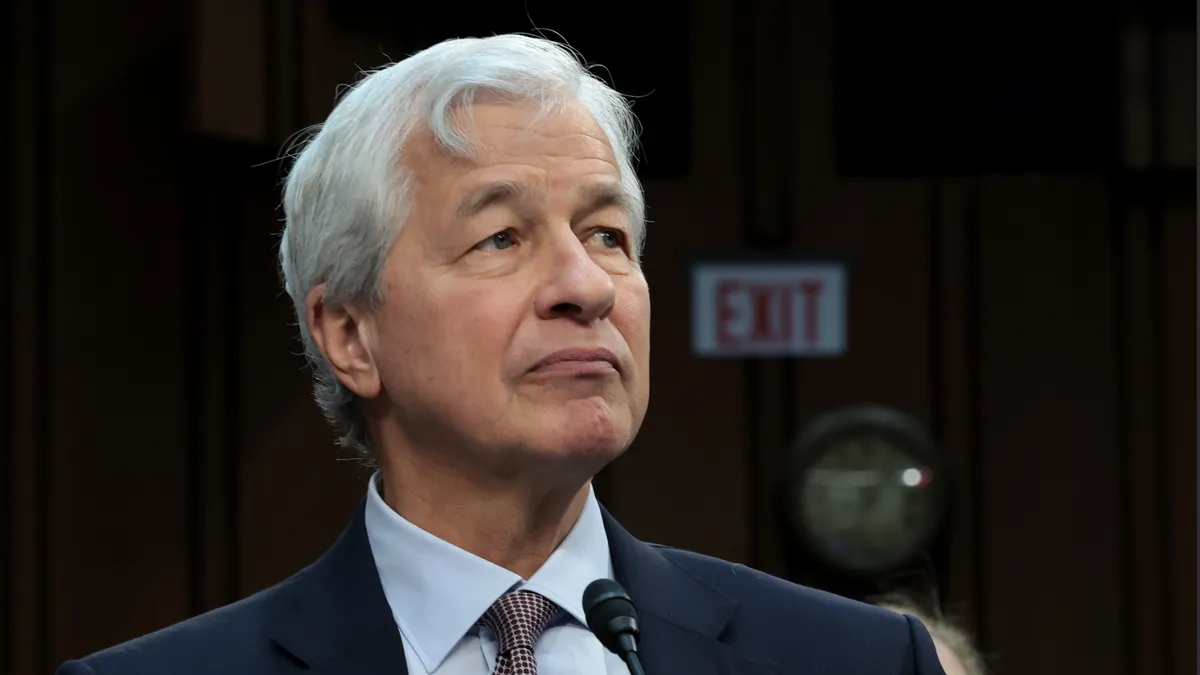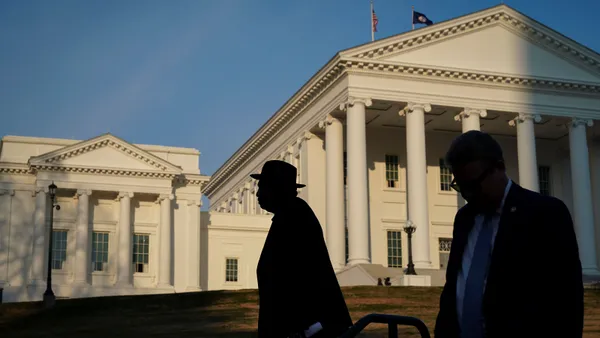Dive Brief:
- JPMorgan Chase CEO Jamie Dimon asserted Wednesday that “there is no magic formula” when it comes to whether CEOs stay on as chairman after they’ve exited the chief executive role, or how long they occupy the board chair seat.
- Dimon, having recently noted that he’ll leave the CEO post within five years, underscored that his time left at the helm of the New York-based bank is up to the board. He could remain CEO for two more years, or more than four years, Dimon said during a Bernstein conference appearance.
- Dimon complained about those who make “binary statements” related to former CEOs remaining board chairmen. “How the hell do they know?” he said. “That’s why you have a board. The board should decide what’s in the best interest of the company.”
Dive Insight:
Dimon, who again argued Wednesday there’s “no evidence” that separation of the CEO and chairman roles benefits a company, pointed to examples of split roles turning out poorly for a company, such as Enron. JPMorgan shareholders last week rejected a proposal to split the CEO and chairman roles and appoint an independent board chair, although the measure garnered support from 42.7% of voters.
Dimon contended there have been cases where former CEOs remained board chairs for years, to great effect. “There’s no magic to it,” he said.
“But the board should do the right thing,” he continued. “If the chairman’s getting in the way of the new CEO, they should go. If the chairman is helping the new CEO in a million different ways, they should stay.”
Dimon applauded former Morgan Stanley CEO James Gorman, who said last week he plans to step down as the bank’s executive chair at the end of the year. Dimon, 68, has been CEO of the bank since 2006. Succession planning is well underway at the bank, which has a deep bench, he said.
“I’ll do the right thing when the time comes, I don’t have to hang on to the CEO or the chairman role forever,” Dimon said. “I got fired once, I was fine,” he added, referring to his time at Citi in the late 1990s.
“But I don’t like cookie cutter solutions,” he said.
Regulatory reform efforts have been a frequent target of Dimon’s ire, and he again Wednesday railed against “endless requirements.” He called on regulators to “take a deep breath” on various reform efforts.
“My own view is, it’s time to revamp the whole regulatory regime,” the CEO said. “It’s all barnacles, and added on top of each other. People should take a step back and say, what is it we’re trying to accomplish?”
Dimon also warned of coming problems in the private credit sector, saying “there could be hell to pay” as retail clients get access to “some of these less liquid products.”
Just prior to Dimon’s appearance at the conference, Wells Fargo CEO Charlie Scharf highlighted the bank’s efforts to grow its investment banking business in a targeted way. “We take a lot of risk today and don’t get paid nearly as much as others do,” Scharf said Wednesday, adding that it’s a business opportunity “staring us in the face.”
“Building our underwriting and our advisory capabilities where we’re already taking the risk, it’s a very obvious place to expand the business,” said Scharf, who’s been CEO since 2019.
Still, he added, “we’ve seen this end badly, for people that have said they’re going to go and build a corporate investment bank, and have done it the wrong way. I think we have a pretty good understanding of what that means, and what ‘right’ means.”
That includes being “very, very targeted” about where the bank has relationships and exposure today, and where it can add capabilities, he noted. Wells continues to operate under a $1.95 trillion asset cap – imposed on the bank by the Federal Reserve in 2018 – tied to its 2016 fake-accounts scandal.
Nearly 50 senior hires have been made in the corporate investment bank in the last several years, Scharf said.
Those include JPMorgan veteran Fernando Rivas, who was named co-CEO of Wells Fargo’s corporate and investment banking business, earlier this month; he now leads the business unit alongside Jon Weiss, who’s been the CEO of that division at Wells since 2020. Earlier this year, Wells also hired another JPMorgan veteran, Doug Braunstein, as vice chair, with an eye toward expanding corporate finance and advisory operations.
“You hire the right people, you’ll get hired,” Scharf said.














